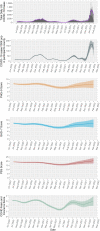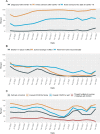The longitudinal effects of stress and fear on psychiatric symptoms in mothers during the COVID-19 pandemic
- PMID: 36151337
- PMCID: PMC9510199
- DOI: 10.1007/s00737-022-01265-1
The longitudinal effects of stress and fear on psychiatric symptoms in mothers during the COVID-19 pandemic
Abstract
The COVID-19 pandemic has been particularly difficult for mothers. Women with a history of peripartum depression (PPD) may be vulnerable to relapse. We sought to understand changes in depressive and anxious symptoms throughout the pandemic and which stressors increased symptoms in women with a history of PPD. In June 2020, all US participants with a history of PPD (n = 12,007) in the global MomGenes Fight PPD study were invited to the COVID-19 follow-up study. Respondents (n = 2163, 18%) were sent biweekly and then monthly surveys until January 31, 2022. We employed time-varying effects models to evaluate trajectories of depressive (patient health questionnaire, PHQ-9) and anxious (generalized anxiety disorder, GAD-7) symptoms and to estimate longitudinal associations between perceived stress, fears, COVID-19 case rates, and symptoms. Peaks of PHQ-9, GAD-7, PSS, and perceived COVID-19 risk scores corresponded with timing of national COVID-19 case surges. High perceived stress was the strongest predictor of PHQ-9 (beta = 7.27; P = 1.48e - 38) and GAD-7 (beta = 7.73; P = 6.19e - 70). Feeling lack of control and unlikely to survive increased PHQ-9 and GAD-7 scores by 2 points. COVID-19 case rates, pandemic restrictions, and region were not independently associated with symptoms. This study suggests that the collective trauma of the pandemic has significantly affected mothers with a history of PPD, exemplified by high levels of perceived stress and the strong association with depressive and anxious symptoms. The next pandemic phase is uncertain, but will continue to influence mental health collectively and dynamically. Interventions must be flexible and responsive and should address fear, trauma, and feelings of control, particularly for mothers with a history of PPD.
Keywords: Anxiety; COVID-19; Depression; Longitudinal; Postpartum; Stress.
© 2022. The Author(s), under exclusive licence to Springer-Verlag GmbH Austria, part of Springer Nature.
Conflict of interest statement
SMB receives research grant funding from Sage Therapeutics and has done educational consulting with MedScape (WebMD).
Figures


Similar articles
-
Depression, Anxiety, and Mother-Infant Bonding in Women Seeking Treatment for Postpartum Depression Before and During the COVID-19 Pandemic.J Clin Psychiatry. 2021 Jul 6;82(4):21m13874. doi: 10.4088/JCP.21m13874. J Clin Psychiatry. 2021. PMID: 34232578
-
Depressive and anxiety symptoms in adults during the COVID-19 pandemic in England: A panel data analysis over 2 years.PLoS Med. 2023 Apr 18;20(4):e1004144. doi: 10.1371/journal.pmed.1004144. eCollection 2023 Apr. PLoS Med. 2023. PMID: 37071605 Free PMC article.
-
Postpartum depression crisis since the second lockdown and 'screening paradox': many women identified, very few treated.BMC Public Health. 2022 Dec 20;22(1):2387. doi: 10.1186/s12889-022-14705-5. BMC Public Health. 2022. PMID: 36539811 Free PMC article.
-
Trajectories of depression and anxiety symptoms during the COVID-19 pandemic in a representative Australian adult cohort.Med J Aust. 2021 Jun;214(10):462-468. doi: 10.5694/mja2.51043. Epub 2021 Apr 26. Med J Aust. 2021. PMID: 33899939 Free PMC article.
-
Comorbid anxiety and depressive symptoms and the related factors among international medical students in China during COVID-19 pandemic: a cross-sectional study.BMC Psychiatry. 2023 Mar 14;23(1):165. doi: 10.1186/s12888-023-04638-7. BMC Psychiatry. 2023. PMID: 36918819 Free PMC article.
Cited by
-
Prevalence of and relevant factors for depression and anxiety symptoms among pregnant women on the eastern seaboard of China in the post-COVID-19 era: a cross-sectional study.BMC Psychiatry. 2023 Aug 7;23(1):564. doi: 10.1186/s12888-023-05059-2. BMC Psychiatry. 2023. PMID: 37550657 Free PMC article.
-
The association between maternal fears about their infant/ toddler during the COVID-19 pandemic and depression and anxiety: a birth cohort study.Braz J Psychiatry. 2023 Nov-Dec;45(6):491-497. doi: 10.47626/1516-4446-2023-3306. Epub 2023 Nov 13. Braz J Psychiatry. 2023. PMID: 37956257 Free PMC article.
-
Effects of anxiety, depression, social support, and physical health status on the health-related quality of life of pregnant women in post-pandemic Korea: a cross-sectional study.Korean J Women Health Nurs. 2023 Sep;29(3):243-252. doi: 10.4069/kjwhn.2023.09.11. Epub 2023 Sep 26. Korean J Women Health Nurs. 2023. PMID: 37813668 Free PMC article. English.
-
Shades of Fear-Mental and Physical Health Reactions to the COVID-19 Pandemic: A Representative Study of Polish Society.Int J Environ Res Public Health. 2023 Jan 27;20(3):2245. doi: 10.3390/ijerph20032245. Int J Environ Res Public Health. 2023. PMID: 36767613 Free PMC article.
-
COVID-19, Anxiety, and Body Mass Index Increase Leptin Levels: a Cross-sectional Multicentric Study.Mol Neurobiol. 2024 Dec;61(12):10041-10050. doi: 10.1007/s12035-023-03788-9. Epub 2023 Dec 20. Mol Neurobiol. 2024. PMID: 38123701
References
-
- American Physological Association (2020) Patients with depression and anxiety surge as psychologists respond to the coronavirus pandemic. Retrieved from https://www.apa.org/news/press/releases/2020/11/anxiety-depression-treat.... Accessed 10 Apr 2022
-
- American Psychological Association (2021a) Demand for mental health treatment continues to increase, say psychologists. Press Release. Retrieved from https://www.apa.org/news/press/releases/2021a/10/mental-health-treatment.... Accessed 10 Apr 2022
-
- American Psychological Association (2021b) Worsening mental health crisis pressures psychologist workforce: 2021b COVID-19 Practitioner Survey. Retrieved from https://www.apa.org/pubs/reports/practitioner/covid-19-2021b. Accessed 10 Apr 2022
MeSH terms
Grants and funding
LinkOut - more resources
Full Text Sources
Medical

